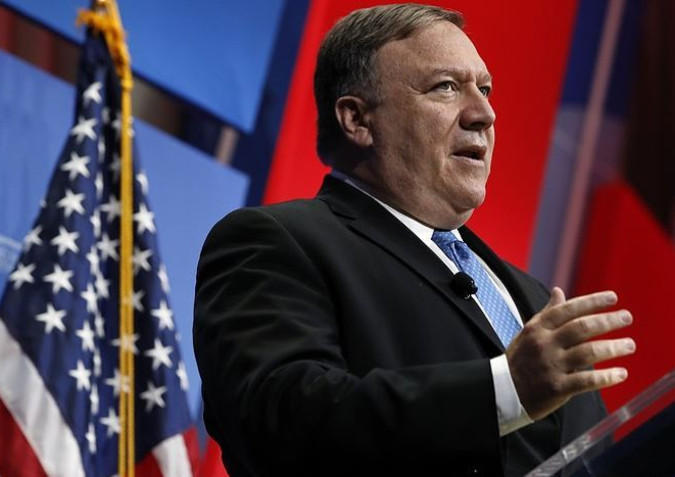TAP will reduce Greece's dependence on Russian gas

By Leman Mammadova
Commissioning of Trans Adriatic Pipeline (TAP) will reduce Greece's dependence on Russian gas, U.S. Secretary of State Mike Pompeo said after negotiations with Alternate Minister of Foreign Affairs of Greece Georgios Katrougalos on December 13, Report informs.
“Diversification of Greece's energy flow through TAP will reduce dependence of southern Europe on Russian gas. In addition to Greece, Bulgaria will be also less dependent on Russia,” he said.
The Joint Statement Regarding the Inaugural United States-Greece Strategic Dialogue stated that there is a need to improve energy security and diversification in Europe, emphasizing recent spot purchase of U.S. LNG and long-term supply negotiations.
The U.S. sees Greece as a pillar of stability in the Eastern Mediterranean region, appreciating its hub role in energy projects of Europe including Revithoussa LNG terminal, the Trans-Adriatic Pipeline, and the Greece-Bulgaria Interconnector as well LNG terminal in Alexandroupolis and the Eastern Med pipeline.
Besides energy cooperation, the two sides also discussed further collaboration in the Eastern Mediterranean and Balkans region, noting the need to integrate the countries of the Western Balkans into European and transatlantic institutions as well as cooperation on renewable energy and efficient coal technology.
It should be noted that EBRD has stopped financing coal projects under the new strategy and views TAP as a great choice to promote coal-to-gas transition in Western Balkans, for countries that have not had access to natural gas.
It is questionable how realistic U.S. hopes for the reduction of gas dependence of Greece on Russia.
Recently, Greek Prime Minister Alexis Tsipras said at a press conference following a meeting with Russian President Vladimir Putin that Greece sees the possibility of Russian gas supplies to Europe via the Trans-Adriatic Pipeline (TAP) noting that Greece has technical conditions for TAP to include Russian gas.
Last summer, Deputy Chairman of the Board of Gazprom, Alexander Medvedev, stated that Gazprom allowed the use of the TAP gas pipeline capacity when implementing the Poseidon project, which involves the organization of a southern route for the supply of Russian gas through Greece to Italy.
The Poseidon gas pipeline project was developed and approved to connect the gas transmission systems of Greece and Italy. It is planned to expand the gas pipeline to ensure direct gas supplies from the Turkish-Greek border to Italy.
As of December 31, 2017, over 44 billion cubic meters of Russian gas have been exported to Greece for the entire period of cooperation. In 2017, deliveries to this country amounted to about 2.9 billion cubic meters, including about 950 million cubic meters through Prometheus and about 50 million cubic meters through Mitilineos.
TAP, along with TANAP, is a part of Southern Gas Corridor project. The project envisages transportation of gas from Azerbaijani Shah Deniz-2 gas field to Greece and southern Italy across the Adriatic Sea through Greece and Albania, and involves designing, construction and operation of the natural gas pipeline.
Approximately 82 percent of the TAP project, including engineering, procurement and construction, was implemented.
On May 29, Baku hosted the launch ceremony of the first phase of the Southern Gas Corridor project.
The Intergovernmental Agreement on the TAP project was signed by Albania, Italy and Greece in February 2013. The 878-kilometer-long TAP pipeline (Greece 550 kilometers, Albania 215 kilometers, Adriatic Sea 105 kilometers, and Italy 8 kilometers) haing connected to the TANAP on the Turkish-Greek border, will run through Greece, Albania and the Adriatic Sea, before coming ashore in Italy’s south.
In November, TAP and TANAP successfully completed their connection on the banks of the Merich River on the Turkish-Greek border.
The TAP pipeline is expected to be commissioned in 2020. The initial capacity of TAP will be 10 billion cubic meters of gas per year with the possibility of doubling it.
The cost of the project is 4.5 billion euros, so far, 3.2 billion euros has been spent.
TAP shareholders include BP (20 percent), SOCAR (20 percent), Snam S.p.A. (20 percent), Fluxys (19 percent), Enagas (16 percent) and Axpo (5 percent).
The TAP project is one of the strategic objectives of the EU in the energy security and diversification of energy sources, chosen as the shortest and direct way to export natural gas from Azerbaijan to the European markets.
---
Follow us on Twitter @AzerNewsAz
Here we are to serve you with news right now. It does not cost much, but worth your attention.
Choose to support open, independent, quality journalism and subscribe on a monthly basis.
By subscribing to our online newspaper, you can have full digital access to all news, analysis, and much more.
You can also follow AzerNEWS on Twitter @AzerNewsAz or Facebook @AzerNewsNewspaper
Thank you!
